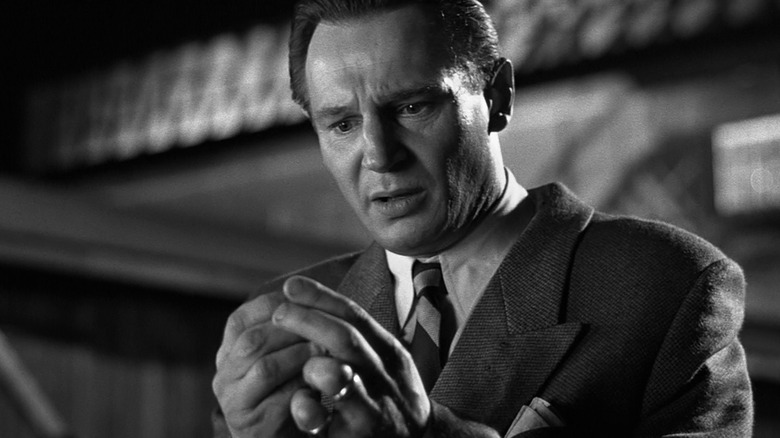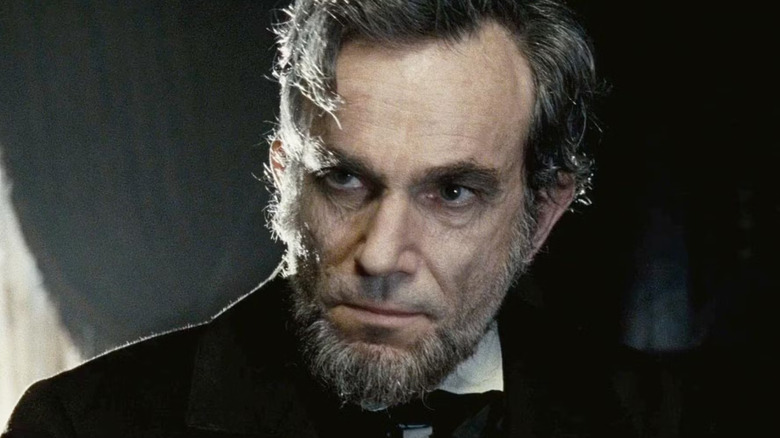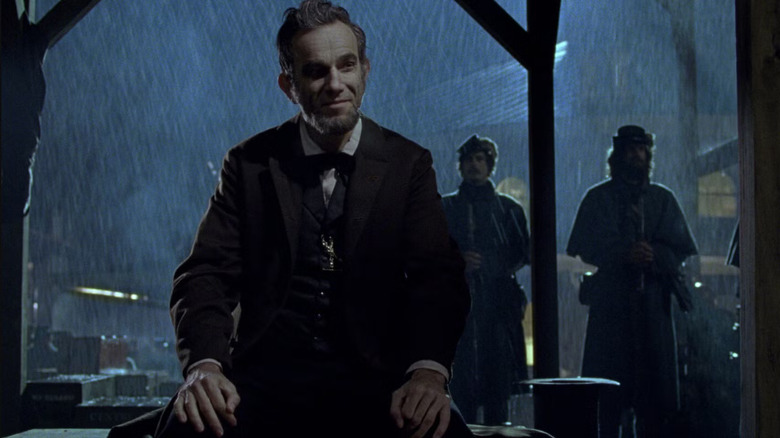Liam Neeson Asked Steven Spielberg To Fire Him From A Movie After A Table Read
Steven Spielberg and Liam Neeson worked together on the 1993 classic "Schindler's List" (seen above). The film tells the story of Oskar Schindler, a German industrialist who hopes to keep his factories open even as the Nazi party comes to power in Germany. He pays off Nazi officials to employ Jewish workers, effectively shielding them from the Nazi death camps. It takes him some time to realize that he's doing something heroic. He soon begins over-employing his factories, pointedly saving as many Jewish people as possible. At the end of the war, he is said to have saved about 1,200 people.
Neeson's performance was sensitive and tragic, and it earned the actor his only Oscar nomination to date. It seemed logical that Neeson and Spielberg should want to work together again at some point, but it took many years for the appropriate project to manifest. In 2005, it was reported by Variety that the project had been found. Neeson was to play Abraham Lincoln in Spielberg's new biography of the 16th President of the United States of America. This was when the director was still shooting his remake of "War of the Worlds," so the film was still a little further in Spielberg's future.
As we now know, Spielberg's "Lincoln" wouldn't be released until the later months of 2012, and it ended up starring Daniel Day-Lewis. That's a delay of seven years, and a major casting change. Between the Variety announcement and "Lincoln," Spielberg would make "Munich," "Indiana Jones and the Kingdom of the Crystal Skull," "The Adventures of Tintin," and "War Horse." During that run, "Lincoln" would mutate a little, and Neeson would drop out. As was reported by /Film, Neeson left "Lincoln" in 2010. At the time, he said he was "past his sell-by date."
However, Neeson clarified his feelings on "Lincoln," and the reason he dropped out, in a 2014 interview with GQ. Very briefly, he felt that he was too old for the part.
Liam Neeson felt that he was too old to play Abraham Lincoln
It seems that Neeson was Spielberg's second choice all along. According to a 2016 article in the New York Times, Daniel Day-Lewis was approached by Spielberg as early as 2003 about playing Abraham Lincoln. Day-Lewis turned the part down at the time, feeling he was uniquely ill-suited to the role. Spielberg seemed hellbent on having an Irish actor play the part, though, and went to Neeson next. Back in the GQ interview, Neeson said that he recalled being contacted about "Lincoln," and he was astonished at the opportunity. In his words:
"Steven had approached me to play it ... f***, it must be ten years ago. Sent me a script, and I was like, 'God.' And he told me roughly when he might want to shoot it, so I started researching. I maybe did four years' worth of research."
Neeson was part of the project for so long that the script changed hands. The original version of "Lincoln," he said, was a more traditional biopic, written by playwright Paul Webb. "From his inauguration to his death," Neeson said. When screenwriter Tony Kushner took over a draft, the focus narrowed to be about the passage of the 13th Amendment and the final months of Lincoln's life. Very slowly, other actors were added to a roster, and Spielberg finally arranged a table-read in 2009. It was during the table-read that Neeson — who had recently lost his wife, actress Natasha Richardson, to a skiing accident — realized he wasn't going to be able to do it. He said:
"Steven got together a reading, and we all sat: Sally Field, John Lithgow. Oh, just great actors. And [Lincoln biography author] Doris Kearns Goodwin, and Steven, of course. We started reading this, and there was an intro, and then I see "Lincoln:" where I have to start speaking, and I just ... a thunderbolt moment. I thought, 'I'm not supposed to be here. This is gone. I've passed my sell-by date. I don't want to play this Lincoln. I can't be him.'"
Neeson was convinced.
The table read of Lincoln went well, but Neeson wasn't feeling it
Neeson said that the table read continued apace, and that he loved the script, but in a very abstract way, he wasn't feeling it. He could have even been distracted by his own sadness over losing his wife less than two months earlier. Whatever the reason, the role of "Lincoln" didn't feel good in his hands. "It was a very strange feeling, and it was partly grief," he said. After the reading, all of Neeson's potential co-stars said he was excellent and that he was well-suited for the role, but Neeson disagreed. The actor continued:
"Afterward, Steven came over, and I said, 'Steven, you have to recast this now.' And he said, 'What are you talking about?' And I said, 'I'm serious. You have to recast it.' So I went back home, and that night I called Doris, and I had a wee chat with her. And then I called Steven, and I said, 'Steven, this is not for me. I can't explain it. It's gone. It's not...' And he got it. He said, 'Okay.' And that was it."
Shortly thereafter, as reported by the Guardian in 2010, Day-Lewis was cast in the role, and all was right with the world. The story went that Neeson, by coincidence, suggested Spielberg call Day-Lewis, not knowing that the pair had already spoken. Spielberg then called Leonardo DiCaprio, the star of his 2002 film "Catch Me if You Can," and asked that he call Day-Lewis, since they both appeared together in Martin Scorsese's epic "Gangs of New York." Day-Lewis was finally worn down and took the part.
Day-Lewis ended up winning an Academy Award for "Lincoln," which was also nominated 11 Oscars besides, including Best Picture, Best Director, and Best Screenplay. It may also be one of Spielberg's best. Neeson dropped out, but everything turned out for the best.


